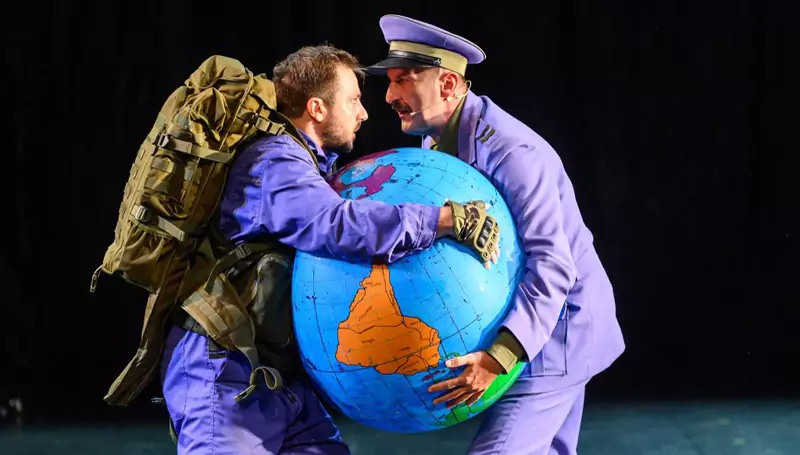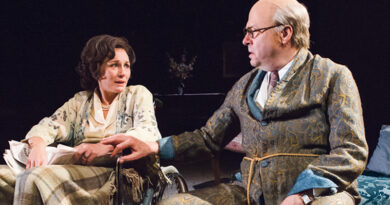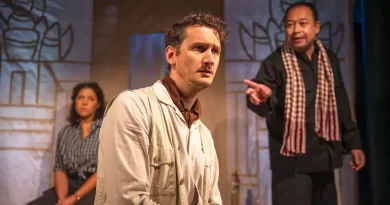Festivalul Național de Teatru 2024
Annie Loui in Cluj, Romania
16-20 October 2024
With the compelling vitality and political lens which are among the hallmarks of Eastern European theatre, artistic director Mihai Maniutiu has assembled five days of varied, and provocative performances at the annual Theatre Festival at the National Theatre of Romania in Cluj. A large open eye graphic on the poster announced the Festival based on a theme of “Otherness” showcasing a range of work from the premiere of a clever new play based on internet romance and identity, to Gábor Tompa’s chilling interpretation of Ionesco’s A Stroll in the Air. A review of festival performances follows:
Songs That Scare Away Fear, after ideas from texts by Herta Müller
Concert/performance by Ada Milea
Songs That Scare Away Fear by the iconic Ada Milea, is a powerful and creative work of theatre. Known for her characteristic interpretations of “knowing” innocence expressed through song, Milea and her band (referred to as “The friend on the electric guitar”, “The friend on the drums” etc) as well as several transforming actors use text excerpts from the Nobel prize-winning Herta Müller’s writing about her childhood in war-haunted Romania.
The playful, Latin-influenced melodies felt like a direct expression of the character’s inner life; whimsical and full of child-like directness and light. The lyrics, inversely, excerpted from Müller’s biography, show the cold strength and love of her simple farmer Mother, and the perceived invincibility of the Nazi party expressed by her Father. Minimal and effective staging echoed the child-like directness of the narrative voice. Particularly effective was a circle of light where shadow play revealed iconographic character gestures “dancing” to the music. Her mother reminded her to take a hanky each day, her best friend waved goodbye in the searing separation of childhood. The war and conflicting ideology of her parents stood silently behind all the action.
In dialogue with the audience the following morning, the set and costume designer Alexandra Mureșan spoke of the work “making itself”; an assemblage of creatives with powerful material to drive it. Maybe, but the cohesion of the performance was something special. The dichotomy of tragic detail through a child’s eyes of hope was a powerful display of juxtaposition. The message was beautifully served by the creative team weaving its own unique form of music/theatre. I hope to see this work widely shared.
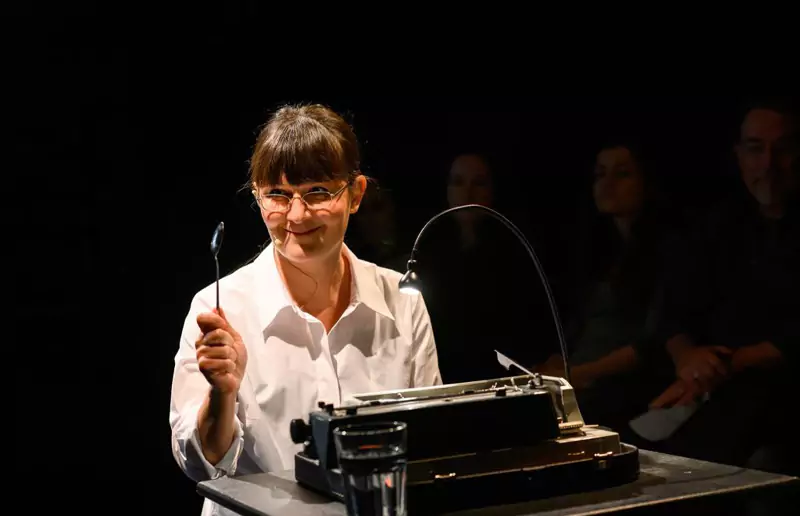
Songs That Scare Away Fear.
Photo credit: Nicu Cherciu.
We Bombed in New Haven by Jospeh Heller
Directed by László Bocsárdi
In the capable hands of director László Bocsárdi, this play of the 1960s originally written as a protest to the Vietnam War, comes to life as a contemporary commentary on war.
Soldiers wait for their mission to bomb a nameless enemy, train in war games organized by “The Captain.” These games deteriorate from marching drills to football skirmishes to playing with building blocks and pacifiers, all enthusiastically embraced by the soldiers obeying orders. The absurdity of an attack on a distant enemy (who we never see, and who is never named) escalates to an attack on a neighbouring town, now named. The implacable prime-mover, “The Major”, addresses the larger ideology when one of the soldiers questions their reality, noting that some soldiers actually disappear. The “kill” is real. The Major smiles – and reveals that indeed, more of them will die; but then as a consequence, more of them will be promoted!
Exaggerated colours and vivid sound and light reinforce the game-like quality of the war machine, and a driving pace and committed work from the fine company of actors, propelled the performance to its chilling ending, where a Kafkaesque rotation of bodies is revealed, and every mother’s child is potential fodder for war.
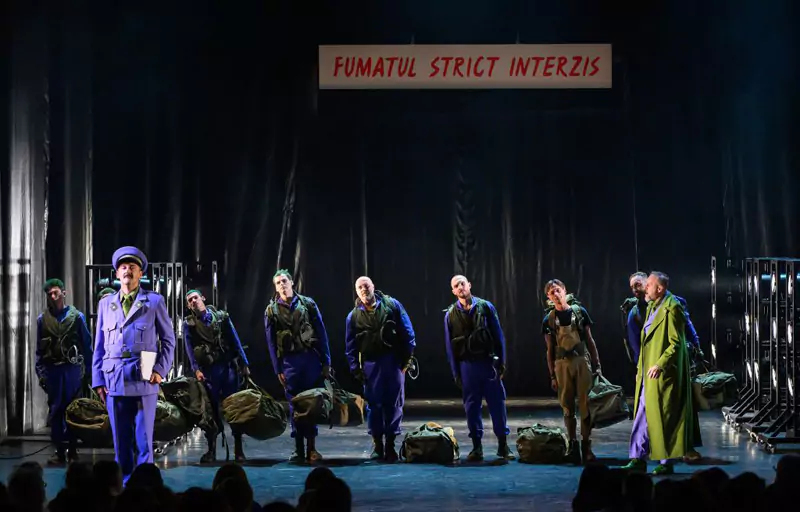
We Bombed in New Haven.
Photo credit: Nicu Cherciu.
Second-Rate Goddesses by Alexandra Felseghi, after an idea by Andrei Mǎjeri
Directed by Andrei Mǎgeri
The golden apple of success lures on. In this performance, three actresses look back on their careers, and discuss their achievements on and off the stage. Rueful commentary and observations on a woman’s life in the theatre are interspersed with Shakespearean monologues and some moving personal accounts of their experiences as mothers and daughters.
A Stroll in the Air by Eugène Ionesco
Directed by Gábor Tompa
A masterfully directed absurdist contemplation of life – and the single man who realizes that he can fly, and returns to tell us what he sees. This is one of the festival performances that most haunts me. On a child’s blow-up toy set of saturated colour and form, Ionesco’s characters discuss the rebel ascendance as they navigate an unstable flooring of inflatable hills under lollypop trees.
An ominous sky of projected celestial planets or a tidal wave at breaking point are backdrops for these quotidian figures of Ionesco plays; a man walking a dog, a couple with a child, an opinionated mustached man in uniform. Threatening overtones develop when the artist’s wife timorously alone faces a vast panel of judges, and is confronted by Death itself sharpening a sickle in a nightmare scene of judgement. She is given a reprieve from Death, time moves on, and the hills become bright green again. As primary colours return to the stage, the exhausted artist returns to the earth. In shock, he reports the apocalypse he has seen from his lofty perspective.
As Heller shows us in We Bombed in New Haven, the slow realization of a reality we are trapped in leads from playful “normalcy” to a chilling epiphany of finality. Regeneration feeding the war machine is Heller’s horror and futility echoed here by Ionesco’s catastrophe of earth and oceans – the wave is always about to break leaving unmitigated rubble covering the planet. Particular praise is due to the well-coordinated design team of A Stroll in the Air, notably the video designer Radu Daniel, for effective and resonant imagery.
Caesar’s Last Love by Horia Gârbea
Directed by Tudor Antofie
In this well-enacted play, five actors luxuriate in roles from famous Shakespearean plays, and then meet onstage in a struggle of power, seduction and dominance. The actors’ own squabbles (about teaching at a theatre school or casting jealousies) blend into the characters they embody and dialogue ensues as the line is blurred between self and portrayal. As in Second-Rate Goddesses, the “Other” is conveyed in the roles that we take on, how they influence us, and how we fight for or against them.
Twelfth Night after William Shakespeare
Directed by Botond Nagy
An enthusiastic audience greeted this playful production of Sixties-influenced imagery unfolding under a sound-scape of diverse and self-parodying music. This is probably the least text-based Shakespeare I have ever seen, where theatrical experience drives all. Orsino is moody in his bathtub, vodka bottles are pulled out of toilets, and Malvolio becomes Malvolia and cross-gartering has a whole new definition. In this joyful comedy of identities, cross-dressing abounds and the mis-matched lovers exist in a world of wonky possibility. Surprising and entertaining, this greatly reduced Shakespeare script retains the plot and flavour of Twelfth Night while interjecting references to pop culture, disco re-mixes and rambunctious and well-choreographed dance breaks. Although the plot is not served (perhaps even confused slightly) by the additional gender-swapping of characters, it is hard not to get pulled into the general joy of the production. Feste sings with heart and soul at the end, and the audience heartily approves. All is well in Illyria.
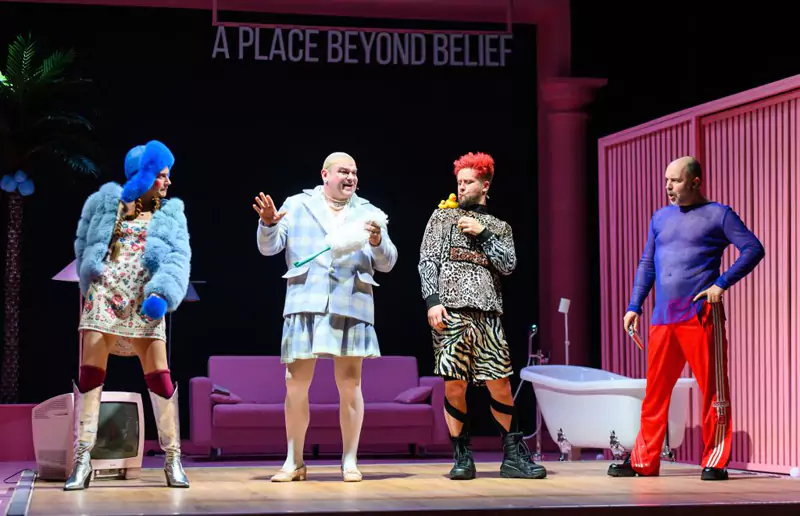
Twelfth Night.
Photo credit: Nicu Cherciu.
How Mr Gherase Fell in Love With Clara Smith by Cosmin Stǎnilǎ
Directed by Doru Vatavului
This was a deeply satisfying production with surprising twists and turns, about love in the age of the internet.
A lonely pensioner meets a young barista from Ghana online. Photos are exchanged, and the dependence on daily communication quickly develops into an on-line relationship. The May/December romance becomes predictably suspect when the young barista starts asking for money for clothes, and then for a plane ticket to Romania so they can meet. Nothing is what it seems, and when the pensioner stops at selling his car to support her travels, there is a stand-off where identities online are unmasked. I will leave you hanging. The clever script was developed by the playwright masquerading as a pensioner online. The beauty of the story is how the relationship continues once true identities are revealed. This is probably why the production felt so satisfying – the “Other” shifts, and our human need for communication must also shift and adjust to the new reality. In this story, human-ness wins out. The staging by Doru Vatavului enhances the dual worlds of computer screens in Romania and Ghana. Use of scrim creates a split screen playing space, where fantasies can play out and canned video feed interfaces skillfully with live performance.
King Stag by Carlo Gozzi
Directed by Tudor Lacanu
Gozzi’s Commedia dell’arte classic fairytale runs elegantly back to Romania in this movement-heavy production. On an empty stage, Commedia-masked performers arrive with suitcases and set up the world of the fairytale of “King Stag” using sticks and a cleverly constructed wagon that transforms into a stage, a forest, and a magical lie-detection machine.
Working in a fusion between Japanese kendo, butoh and Commedia, the able company commits to the physical theatre storytelling under the capable movement direction of Cǎtǎlin Codreanu and director Tudor Lacanu. Stereotypic characters from the Commedia form continue to please with their whimpering and wavering between good and evil and self-serving laziness. A noble prince searches for and finds true love with the help of magic, but that is only the beginning of King Stag. As the story unfolds there are multiple tests of honesty, magical transformations, reversals and unwitting reveals. The beloved “Other” is identified despite appearances, and love (with the help of a little magic) wins out in the end; good is rewarded and evil vanquished. The audience was enchanted and applauded the outcome with relief and delight. There is a reason we love fairy tales.
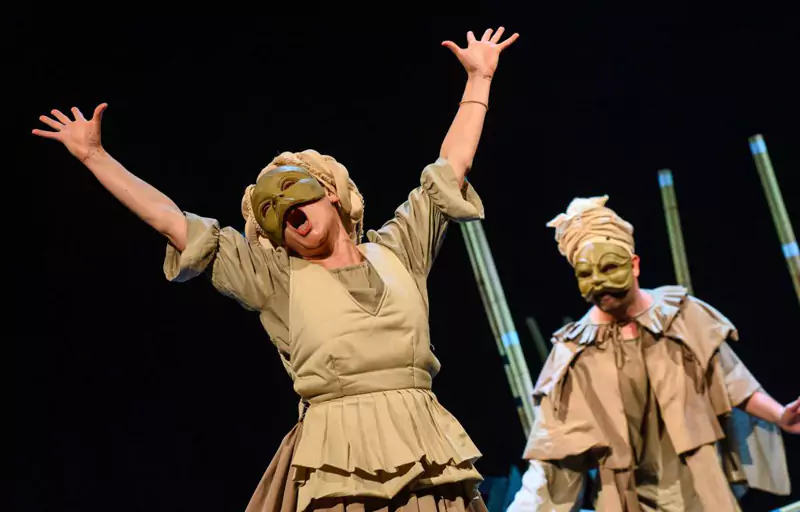
King Stag.
Photo credit: Nicu Cherciu.

